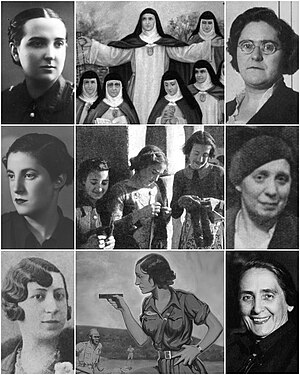| Part of a series on |
| Women in the Spanish Civil War |
|---|
 |
|
|
Motherhood in the Spanish Civil War period was a political concept around the idea of women's involvement in support of the state. The blending of definitions of motherhood and womanhood had been occurring in Spain long before this though, with a woman's role being defined as being in the house part of a biological determinism perspective supported by male run institutions in Spain, including the Government and the Catholic Church.
The role of motherhood was debated when it came to women's education. Those on the left argued it was important for the emancipation of women, while those on the right argued it was important for preparing girls and young women in becoming mothers. Little changed during the Dictatorship of Primo de Rivera, except biological determinism became more prominent.
The Second Spanish Republic allowed them to formally enter the public sphere en masse, while also seeing a number of rights available to women for the first time like the right to vote, divorce and access to higher education. Motherhood became more political, and in some circles gender non-conforming women and mother were met with increased hostility. Rights earned by women were viewed by Nationalists as a degeneration of Spain, which would result in the destruction of the Spanish family. Organizations were created to support traditional definitions of Spanish motherhood. Public violence against women and mothers defending striking workers also increased.
The Spanish Civil War saw definitions of motherhood become more political, but still traditional in that womanhood was defined as motherhood. Life in rural areas for mothers could remain largely apolitical but it also saw the upset of the family structure in some places as houses emptied of men or those who remained had to be less traditionally masculine in order to survive. Gender roles were also broken as many women went to the front and many mothers needed to work outside the home to serve war efforts.
The end of the war ushered in the period of Francoist Spain, and the return of motherhood defined around traditional Spanish Catholicism supported by a series of laws that made women wards of their fathers and husbands. Education for girls and women again focused on maintaining the home and becoming good mothers.
© MMXXIII Rich X Search. We shall prevail. All rights reserved. Rich X Search
